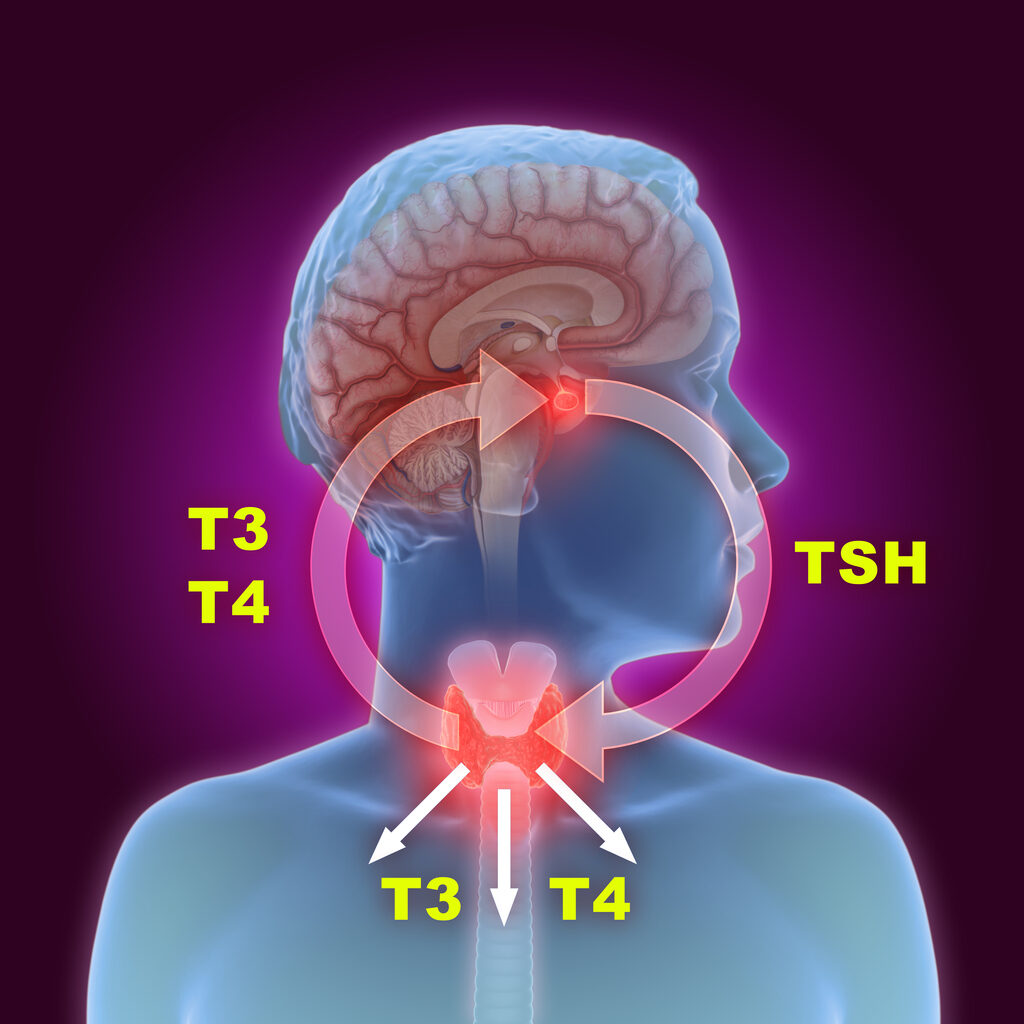As we age, women are especially prone to hypothyroidism, also known as an underactive thyroid. Thirteen percent of women between the ages of 35 to 65 have this condition, an amount that increases to 20% for women over the age of 65. In addition, eight times as many women as men suffer from this ailment.
The thyroid is a tiny butterfly-shaped gland in the front of the neck, just under the larynx, and it influences essentially every organ in the body. Place your fingers on either side of your Adam’s apple, then swallow, and you will feel your thyroid gland sliding under your fingers. It secretes hormones into the bloodstream, which regulate metabolism – the rate at which our body converts food and oxygen to energy and controls our body temperature and heart rate.
The hypothalamus gland interacts with the pituitary gland through thyroid-stimulating hormones (TSH). This interaction prompts the thyroid to release its hormones: 1) T3 or triiodothyronine and 2) T4 or thyroxine. Basically, an underactive thyroid occurs when the thyroid gland doesn’t make enough thyroxine (T4).

Symptoms
There are many symptoms of hypothyroidism:
- Fatigue – low energy, feeling exhausted and sluggish, unrested even with good sleep, low motivation, tired or frequently sleepy
- Constipation – The lack of thyroid hormones slows the digestive system, which can cause infrequent bowel movements.
- Dry skin – Skin cells don’t regenerate as normal with fewer thyroid hormones, so the outer skin layer contains more dead skin that is dry and flaky. One study showed 50% of those with hypothyroidism said their skin had gotten worse in the past year.
- Hair loss – Hair follicles also have a short lifespan and rapid turnover, so they regenerate more slowly with an underactive thyroid, and hair loss can occur.
- Brittle nails – As all systems slow down, the body prioritizes critical survival functions. Because nail growth is not considered critical, your nails can become brittle.
- Muscle or joint pain – Slow metabolism switches toward catabolism, which is the body breaking down tissues like muscles for energy, which to aches and pains.
- Muscle weakness – Catabolism also causes muscles to decrease in strength.
- Depression – The reason that an underactive thyroid causes depression is not well understood, but 64% of women and 57% of men with hypothyroidism report experiencing it.
- Forgetfulness (brain fog) – While not universal, over one-third (39%) of low thyroid sufferers report experiencing memory problems and forgetfulness.
- Difficulty focusing – Low thyroid hormones slow down the brain leading to an inability to focus and trouble concentrating.
- Cold intolerance – Heat is a byproduct of burning calories, so as metabolism decreases, the basal metabolic rate also declines, reducing the amount of heat the body generates.
- Hoarse voice – Low thyroid hormones can cause vocal changes, including hoarseness, vocal fatigue, and decreased range.
- Carpal tunnel syndrome – Low thyroid causes water retention, which can affect the hands, wrists, and fingers.
- Puffy face – Likewise, retention of water can show up in the face as well.
- Swollen legs, ankles, or feet – Water retention can also settle lower in the body around the ankles and feet, causing them to swell.
- Weight gain – Low thyroid causes the metabolism to slow, so instead of burning calories for growth and activity, the body tends to store more calories from the diet as fat. One study showed an average weight gain of 15-30 pounds in the year following an underactive thyroid diagnosis.
While many of these symptoms could indicate various other diseases, a diagnosis of hypothyroidism is usually attained through a simple blood test.
Causes
There are six main causes for an underactive thyroid, which are often permanent:
- Hashimoto’s thyroiditis, an autoimmune disorder that makes antibodies that attack the thyroid gland, causes it not to produce adequate thyroid hormones.
- Hereditary conditions, like Hashimoto’s thyroiditis, Addison’s Disease, type 1 diabetes, and rheumatoid arthritis, are inherited and can cause issues with the thyroid.
- Surgical removal of all or part of the thyroid.
- Radiation that was received as treatment for cancer or other diseases of the head or neck.
- Pituitary gland damage or disorder that affects the release of TSH to the thyroid.
- Hypothalamus disorder dampens the release of a hormone called TRH. This hormone tells the pituitary gland to release TSH so that the thyroid will then release its hormones.
Other causes can be temporary in nature, including:
- Inflammation of the thyroid gland from an infection, pregnancy, or autoimmune issue
- Side effects from medications, especially amiodarone, interferon-alpha or interleukin-2
- Iodine deficiency (because the thyroid uses iodine to make its hormones)
- Pregnancy can occasionally cause postpartum thyroiditis (only 5% of women).
Risk Factors
Factors that increase the risk of developing hypothyroidism include:
- Race – white or Asian
- Age – post-menopausal
- Prematurely graying hair
- Autoimmune disorders
- Bipolar disorder
- Down syndrome
- Turner syndrome
Diagnosis
As mentioned, the diagnosis of an underactive thyroid is relatively easy with a blood test called a thyroid-stimulating hormone test, which identifies levels of TSH and T4.
Test results include:
- TSH levels between .45 and 4.5 indicate normal function.
- TSH above 4.5 but with normal T4 (.8 to 2.0) is subclinical hypothyroidism and may or may not be treated, depending on the symptoms and family history.
- A high TSH and low T4 indicate an underactive thyroid and should be treated.
Even if your blood test results are normal, you may still be encouraged to have a thyroid ultrasound to check for nodules or inflammation.
Treatment
The treatment for hypothyroidism is relatively easy. It often includes taking a pill of synthetic T4 hormone and for some, a small dose of T3, which is intended to lower your TSH. It may take some trial and error to get the dosage correct because too much hormone can cause increased appetite, sleep problems, heart palpitations, or shakiness. Your blood will typically be checked every 6-12 months to ensure correct TSH and T4 levels. In very mild cases, the issue may abate over time or shortly after starting treatment. However, if the condition doesn’t dissipate, it can be easily controlled with medication for a very normal life.
Complications
Hypothyroidism is important to diagnose because if left untreated, it may result in myxedema. This can cause high blood pressure, high cholesterol, heart disease, anemia, breathing problems, a goiter (enlarged thyroid), balance issues, confusion, peripheral neuropathy (tingling nerves or numbness), or even a coma.
Prevention
Unfortunately, hypothyroidism cannot be prevented, although one recommendation is to make sure to get enough iodine in your diet, typically through iodized salt. Other helpful foods are eggs, dairy products, meat, poultry, seafood, and edible seaweed. You should also avoid smoking and other tobacco products and try to keep your stress levels down.
With such an easy diagnosis and easy treatment, be sure to get checked if you suspect you may have an underactive thyroid.
Read Next:









